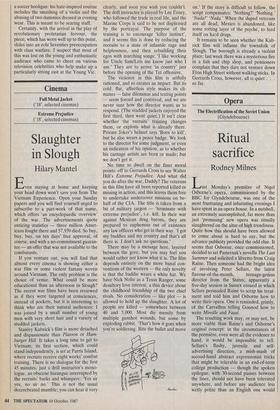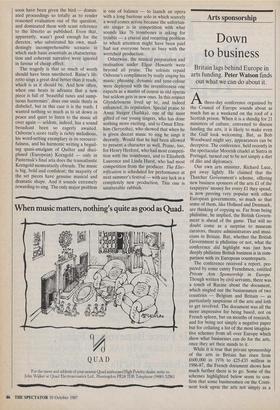Opera
Ritual sacrifice
Rodney Milnes
Last Monday's premiere of Nigel Osborne's opera, commissioned by the BBC for Glyndebourne, was one of the most frustrating and infuriating evenings I have spent in an opera house. In a nutshell, an extremely accomplished, far more than just 'promising' new opera was ritually slaughtered on the altar of high trendiness. Quite how this should have been allowed to come about is hard to say, but the advance publicity provided the odd clue. It seems that Osborne, once commissioned, decided to set Pasternak's novella The Last Summer and solicited a libretto from Craig Raine. Then someone had the bright idea of involving Peter Sellars, the latest flavour-of-the-month, teenage-genius director from the States; apparently a five-day session in Sussex ensued in which Sellars persuaded Raine to scrap his treat- ment and told him and Osborne how to write their opera. One is reminded, grimly, of the Carvalhos telling Gounod how to write Mireille and Faust.
The resulting work may, or may not, be more viable than Raine's and Osborne's original concept: in the circumstances of the premiere, even were all the evidence to hand, it would be impossible to tell. Sellars's flashy, juvenile and self- advertising direction, a mish-mash of second-hand abstract expressionist tricks that might be tolerable in an end-of-term college production — though the spoken epilogue, with 30-Second pauses between the lines, should not have been tolerated anywhere, and before any audience less wetly polite than an English one would soon have been given the bird — domin- ated proceedings so totally as to render reasoned evaluation out of the question, and dominated them with scant reference to the libretto as published. Even that, apparently, wasn't good enough for the director, who substituted his own, mad- deningly incomprehensible scenario in which such basic essentials as characterisa- tion and coherent narrative were ignored in favour of cheap effect.
The tragedy is that so much of worth should have been smothered. Raine's lib- retto sings a great deal better than it reads, which is as it should be. And how often, when one hears in advance that a new piece is full of 'beautiful tunes and sump- tuous harmonies', does one smile thinly in disbelief, but in this case it is the truth: I wanted nothing so much as to sit down in peace and quiet to listen to the music all over again — seldom, indeed, has a sound broadcast been so eagerly awaited. Osborne's score really is richly melodious, his word-setting exemplary in its resource- fulness, and his harmonic writing a beguil- ing quasi-amalgam of Quilter and disci- plined (European) Korngold — only in Pasternak's final aria does the transatlantic Korngold momentarily obtrude. The music is big, bold and confident; the majority of the set pieces have genuine musical and dramatic shape. And it sounds extremely rewarding to sing. The only major problem is one of balance — to launch an opera with a long baritone solo in which scarcely a word comes across because the unfortun- ate singer is in competition with what sounds like 76 trombones is asking for trouble — a crucial and recurring problem to which attention might have been paid had not everyone been so busy with the wretched production.
Otherwise, the musical preparation and realisation under Elgar Howarth were beyond all praise. The soloists repaid Osborne's compliment by really singing his music: phrasing, dynamic and tone-colour were deployed with the inventiveness one expects as a matter of course in old operas but seldom gets in new ones. In this respect Glyndeboume lived up to, and indeed enhanced, its reputation. Special praise to Anna Steiger (Sashka), one of the most gifted of our young singers, who has done nothing more exciting, and to 'Omar Ebra- him (Seryezha), who showed that when he is given decent music to sing he sings it decently. Would that he had been allowed to present a character as well. Praise, too, for Henry Herford, who had most competi- tion with the trombones, and to Elizabeth Laurence and Linda Hurst, who had most competition from the producer. The Elec- trification is scheduled for performance at next summer's festival — with any luck in a completely new production. This one is unutterable rubbish.



























































 Previous page
Previous page